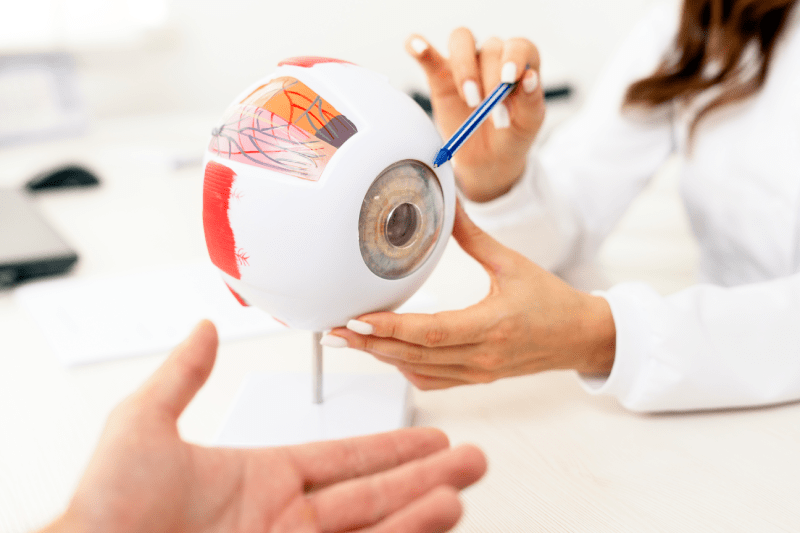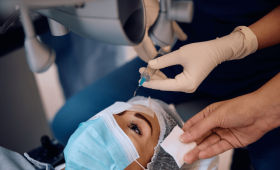Is Cataract Surgery Painful?
Cataract surgery is one of the most frequently performed operations in modern medicine and has the highest success rates. Thanks to technological advancements, and especially the widespread use of the Phacoemulsification (FAKO) method, the patient’s biggest concern, the feeling of pain and discomfort, has now been minimized. Turkey, with its advanced anesthesia methods and microsurgical techniques used in health tourism, offers patients a pain-free and comfortable experience. Here are the 35 most frequently asked questions about the level of pain and comfort by those considering cataract surgery.
Is Any Pain Felt During The Surgery?
No pain is usually felt during the surgery because effective local anesthetic drops are applied to the eye before the procedure, and these drops completely numb the nerve endings on the eye’s surface. In some cases, mild sedation (a tranquilizer) may also be administered intravenously to relax and calm the patient, maximizing comfort. Therefore, the only sensation felt during the operation is the feeling of touch or pressure around the eye, but this is not perceived as pain. This comfort standard is kept at the highest level in modern clinics in Turkey.
What Anesthesia Method Is Used In Cataract Surgery?
The primary anesthesia method used in cataract surgery is topical (drop) anesthesia. This method numbs the eye’s surface with special drops, eliminating the need for injections or general anesthesia. This shortens the operation time and speeds up the patient’s recovery process. In rare patients with severe anxiety or specific medical conditions, local injection anesthesia or general anesthesia may be preferred. The most appropriate anesthesia method is determined in Turkey to ensure patient comfort.
How Long Does Post-Operative Pain Last?
Severe pain is generally not expected after the surgery. Patients may experience complaints such as burning, stinging, foreign body sensation, or mild discomfort in the eye for the first few hours. These sensations are easily controlled with prescribed pain relievers and antibiotic drops. Generally, this mild discomfort significantly reduces within the first 24 hours and disappears completely within a few days. Excessive pain in the post-operative period can be a sign of a rare complication and should be immediately reported to the physician.
What Is The Sensation Immediately After The Surgery?
Immediately after the surgery, there may be a sensation of mild watering and glare in the eye. As the effect of the anesthesia begins to wear off, a slight stinging or feeling like sand is in the eye may appear. Patients usually notice a rapid improvement in vision quality. The eye is covered with a protective shield after the operation, and the patient must use this shield as directed by the doctor. In Turkey, detailed information is provided to the patient about this transition period before discharge.
How Does Laser Use Affect The Sensation Of Pain?
Laser-assisted cataract surgery (Femto laser) creates less trauma because it performs part of the surgical incisions and lens fragmentation with a high-precision laser instead of a blade. This minimizes tissue damage during and after the operation, potentially reducing the patient’s pain and discomfort level. This advanced technology is frequently preferred in Turkey to increase patient comfort.
Does Pre-Operative Tension Increase The Sensation Of Pain?
Yes, the anxiety and tension felt before the operation can lower the body’s pain threshold, increasing the perception of discomfort. This is more of a psychological reaction than a physiological one. For this reason, the mild sedation applied to some patients before the operation helps the patient to calm down, leading to a smoother operation and a reduced perception of post-operative pain. Centers in Turkey prioritize psychological support for patient comfort.
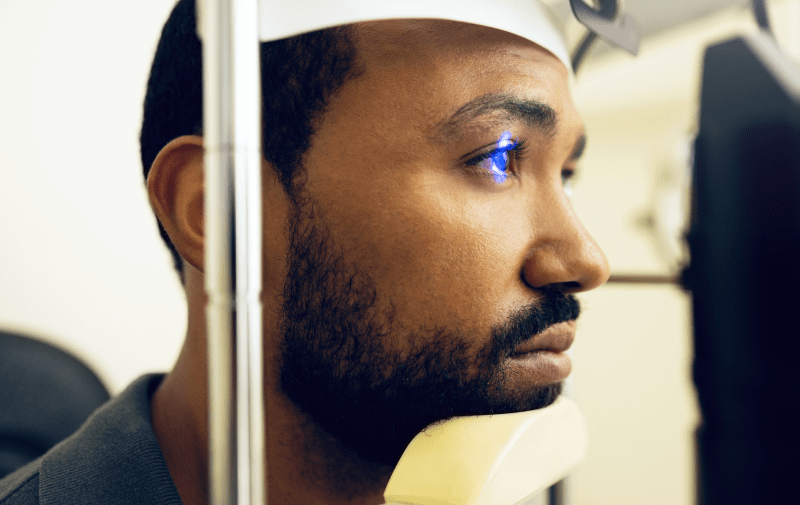
What Is The Role of The Phaco Method In Pain Reduction?
The Phacoemulsification (FAKO) method plays a critical role in reducing pain because it requires a much smaller incision (2-3 mm) compared to traditional methods. The small incision eliminates the need for stitches and minimizes tissue trauma. Less trauma reduces post-operative inflammation and therefore pain. The FAKO standard in cataract surgeries in Turkey forms the basis of a comfortable recovery process.
Which Medications Are Used For Post-Operative Pain?
To control the mild discomfort and pain that occurs after surgery, prescribed non-steroidal anti-inflammatory (NSAID) drops and standard painkiller pills are generally used. These drops also help reduce post-operative inflammation and swelling. Patients must use these medications regularly as instructed by the doctor for a pain-free recovery.
What Causes The Stinging And Burning Sensation In The Eye?
The stinging and burning sensation in the eye usually occurs due to the drying of the eye’s surface (cornea) during the operation and the effect of the drops used after the surgery. Temporary dry eye can also cause this sensation. This discomfort is described as irritation rather than pain and is largely alleviated by using moisturizing artificial tear drops. Appropriate drop protocols for these temporary symptoms are established for patients in Turkey.
Is There A Risk Of The Patient Moving During The Surgery?
No, the risk of the patient making involuntary or sudden movements during the operation is very low thanks to the local anesthesia and/or sedation applied. The patient’s eye is stabilized under the microsurgery microscope. The surgeon collaborates with the patient before the operation to explain the importance of not moving. Sedation, especially in anxious patients, increases surgical safety and comfort by preventing patient movement.
Are There Special Precautions For Patients With A Low Pain Threshold?
Yes, sedation (a state of conscious sleep) is a special precaution for patients with a low pain threshold or those who are very anxious. With sedation, the patient is relaxed but remains awake enough to follow instructions. This makes the surgical experience much more comfortable. Modern anesthesia techniques in Turkey can be customized according to each patient’s needs.
Does Post-Operative Redness Cause Pain?
The slight redness that occurs in the eye after surgery is usually due to irritation left by the instruments used during the operation on the eye’s surface or mild bleeding from capillaries. This redness generally does not cause pain, but may be accompanied by a slight discomfort. Redness usually disappears on its own within a few weeks. Patients are informed in Turkey that this is a normal part of the healing process.
How Does The Duration of The Surgery Affect The Sensation of Pain?
The duration of cataract surgery is usually very short, ranging from 10 to 20 minutes. The short duration of the operation reduces the time the eye is open and the trauma applied to the tissue, thus lowering the risk of pain sensation. Longer operations may cause more dryness on the eye’s surface and, consequently, more post-operative discomfort. The speed and experience of surgeons in Turkey maximize your comfort.
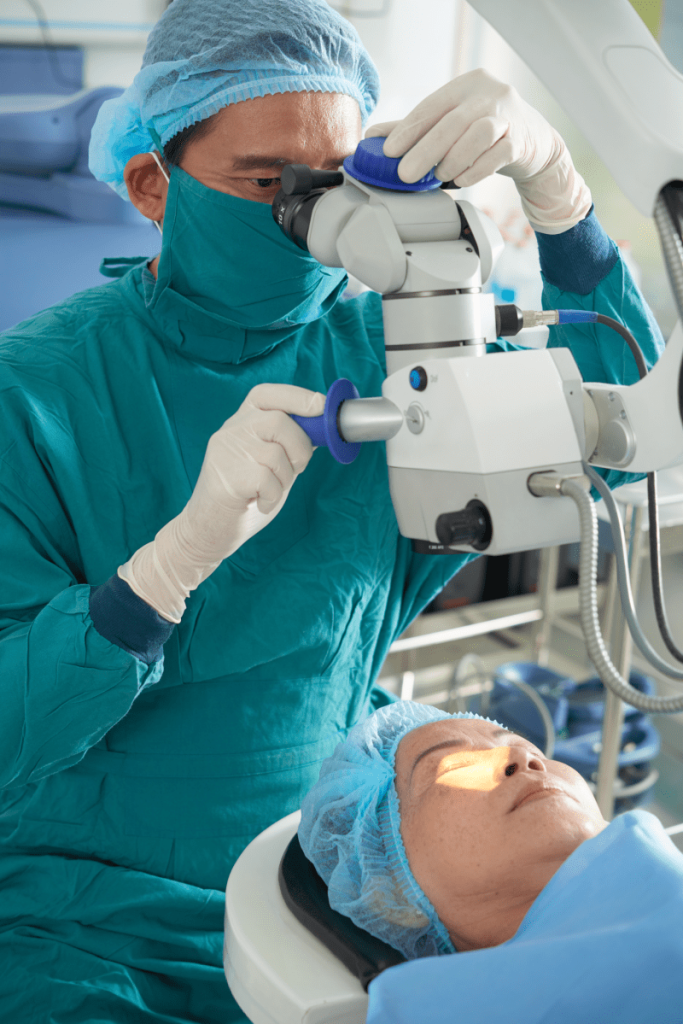
What Complication Can Severe Pain Be A Sign Of?
Severe and increasing pain that occurs after the first day following the operation can be a sign of a rare but serious complication called intraocular infection (endophthalmitis). This condition requires emergency intervention as it can lead to vision loss. Therefore, it is essential to contact your surgeon immediately if you experience symptoms like severe pain, vision loss, or swelling.
Is Strain Felt While The Eyelid Is Kept Open During The Surgery?
No, the eyelid is kept open during the operation using a special instrument (speculum). Thanks to the droplet anesthesia, no strain or pain is felt while this instrument holds the eyelid. Patients only perceive a slight pressure or touch sensation during this process. This instrument is designed to allow the surgeon to work comfortably without disturbing the patient’s comfort.
What Does The Post-Operative Itching Sensation Mean?
The itching sensation that occurs after surgery is usually a sign that the wound is starting to heal or of temporary dry eye. However, the eye must absolutely not be rubbed, as rubbing can lead to the opening of the incision site or an increased risk of infection. Artificial tears or mild anti-allergic drops recommended by the physician can be used for itching.
How Quickly Do Painkiller Drops Numb The Eye?
The painkiller drops used for topical (drop) anesthesia usually numb the eye’s surface completely and make it ready for the surgical procedure within a few minutes of being instilled. The effect of the anesthesia is maintained by continuous drop supplementation during the operation. After the surgery, its effect slowly diminishes, giving way to a mild sensation of discomfort.
What Are The Pain Control Protocols In Turkey?
Pain control protocols in cataract centers in Turkey are three-phased: pre-operative, during the operation, and post-operative. Pre-operative anxiety management, topical anesthesia and sedation during the operation, and the regular use of painkiller and anti-inflammatory drops after the operation are standard. This holistic approach aims for the patient to have a pain-free and comfortable process.
Is A Pressure Sensation In The Eye Normal During The Recovery Process?
Yes, a slight pressure or fullness sensation in the eye during the recovery process is normal. This condition may arise from mild internal inflammation after the surgery or temporary fluctuations in intraocular pressure. This sensation usually decreases within the first few days and is not a cause for concern unless accompanied by severe pain. The drops recommended by your physician help alleviate this pressure sensation.
Does Contact Lens Use Increase Pain?
Patients who have used contact lenses for many years before the operation may have a more sensitive or dry eye surface (cornea), which may temporarily increase the stinging and discomfort sensation after the surgery. This does not affect the success of the operation. Surgeons in Turkey aim to ensure comfort by prescribing more intensive artificial tear drops to patients who use lenses during the recovery period.
Does The Failure of The Surgery Cause Pain?
The failure of the surgery is usually associated with infection or retinal complications, and these conditions can cause severe pain. Routine failures (e.g., not reaching the targeted prescription) do not cause pain, but if a serious complication develops, it manifests itself as pain and vision loss. Severe pain is one of the most important warning signs after surgery.
Does Astigmatism Correction Affect The Pain Level?
Astigmatism correction, as it is usually performed simultaneously with the placement of a Toric Intraocular Lens (IOL), does not significantly increase the pain level of the operation. Rarely, a slight increase in the number of incisions on the cornea may slightly prolong the mild stinging sensation on the first day. However, this difference is manageable with standard painkillers. Astigmatism correction is performed comfortably in Turkey.
Does Post-Operative Sleep Routine Help In Pain Management?
Yes, regular and sufficient sleep after the operation significantly helps in pain management by accelerating the body’s healing process and reducing stress levels. Using the shield that protects the eyelid while sleeping prevents accidental rubbing of the eye, which supports wound healing and prevents trauma that could cause pain.

Does The Presence of The Intraocular Lens (IOL) Cause Discomfort?
No, the intraocular lens (IOL) is a biocompatible material designed to integrate with the eye’s natural structure and is not felt by patients after it is placed. The presence of the lens does not cause any discomfort, stinging, or pain. After a successful operation, the lens becomes a natural part of the visual function and provides permanent comfort.
Is A Stinging Sensation Normal When Using Eye Drops?
Yes, it is normal for some of the medicated eye drops used after surgery (especially those containing antibiotics and corticosteroids) to cause a slight burning or stinging sensation when instilled into the eye. This is a temporary sensation and is caused by the medication itself. Since the regular use of drops is essential for healing, this mild discomfort should be tolerated.
Does Seeing Bright Light During The Surgery Cause Pain?
The microscopic light used by the surgeon during the operation is quite bright, and the patient perceives this light strongly. However, this light does not cause pain; it only creates a sensation of glare or brightness. This light, which helps to see the exact focal point of the eye, illuminates the surgical field and helps keep the eye still during the procedure.
What Is The Importance of Nutrition In Post-Operative Pain Management?
Although post-operative pain management is not directly related to nutrition, consuming healthy foods with anti-inflammatory properties (omega-3, vitamins) can reduce general inflammation in the body, support the healing process, and indirectly help reduce the feeling of discomfort. Adequate fluid intake is also important in reducing dry eye.
How Does Cold Application Reduce Pain And Swelling?
Applying a cold compress is an effective method for reducing swelling (edema) and inflammation around the eye after surgery, thereby alleviating the sensation of pain. Cold application, especially when done intermittently during the first 24-48 hours, controls swelling by constricting blood vessels and helps the patient feel more comfortable. Clinics in Turkey often recommend cold application as a suggested method.
When Should A Doctor Be Consulted For Post-Operative Pain Control?
A doctor should be consulted immediately for post-operative pain control if the pain, which is not relieved by prescription medication, is constantly increasing, throbbing, or sharp. The normal feeling of discomfort should decrease with medication and disappear completely over time. Severe pain, vision loss, excessive redness, or purulent discharge in the eye are considered emergency situations.
Can Cataract Surgery Be Performed Under General Anesthesia?
Yes, cataract surgery can rarely be performed under general anesthesia, especially in young children, highly anxious patients, or those with mental disabilities. However, this is not a standard procedure, and general anesthesia carries additional risks compared to local anesthesia. General anesthesia guarantees that absolutely no pain is felt during the operation.
Do Painkiller Medications Affect Intraocular Healing?
Standard prescribed painkiller and anti-inflammatory drops generally support post-operative healing positively because they control inflammation and swelling. However, using systemic (pill) painkillers in high doses and for long periods, which are not recommended by the doctor, can indirectly affect the healing process.
How Does A Traumatic Surgery Increase Pain?
If the surgery is traumatic for any reason (e.g., hard cataract or complications), it increases tissue damage, thereby increasing post-operative inflammation and swelling. This prolongs the recovery time and causes the patient to feel more discomfort or pain. Experienced surgeons and modern FAKO devices minimize trauma.
Is YAG Laser Treatment A Painful Procedure?
YAG Laser treatment (secondary cataract treatment) is an outpatient procedure that is completely painless. The eye is numbed with anesthetic drops before the procedure, and the laser creates a small opening in the capsular bag, clearing the vision. Patients may only hear a few light clicking sounds during this time.
Is It Normal To Experience A Headache After Surgery?
Experiencing a mild headache after the operation may be due to the position during the surgery, anxiety, or the eye reacting to bright light after the operation, rather than the surgery itself. This headache is usually mild and quickly subsides with standard painkillers. Severe headaches, however, can rarely be associated with increased intraocular pressure.
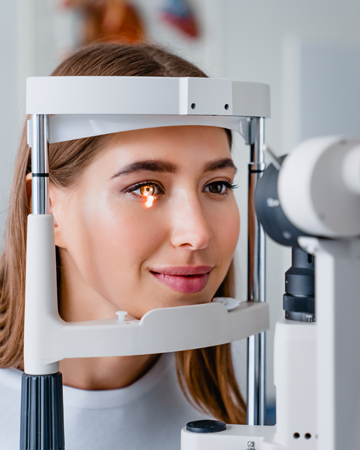
Can A Painless Surgery Guarantee Be Given?
A 100% pain-free outcome cannot be absolutely guaranteed for any surgical procedure, as pain perception varies from person to person. However, the pain felt in modern cataract surgery (FAKO + topical anesthesia) is at a level of minimal discomfort for almost all patients. Experienced teams in Turkey minimize the risk of pain by implementing the highest level of comfort protocols.
Contact Cure Holiday For Painless Vision Quality
Cataract surgery in our age is not a procedure to be feared; on the contrary, it is a comfortable solution that is applied and immediately improves your quality of life. Turkey, by utilizing the latest anesthesia and microsurgical techniques, ensures that the surgery is pain-free and the recovery process is fast.
If you are postponing surgery due to pain concerns, Cure Holiday will guide you in contacting hospitals in Turkey that provide international standard services, promising a pain-free and safe surgical process. Contact Cure Holiday immediately for your eye health and comfort, and take the first step towards clear vision.
